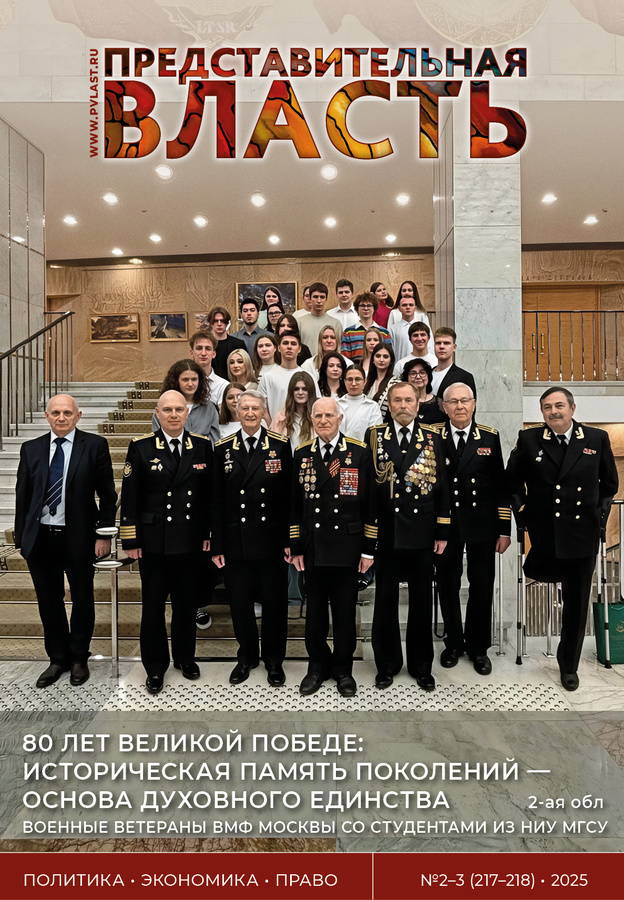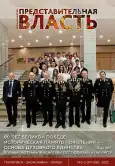Representative government — the 21st century: legislation, comments, problems
ISSN (print): 2073-9532
ISSN (online): 2073-9540
«Representative power – 21st century» is an international, interdisciplinary, peer-reviewed and open-access journal issuing research and development articles within a new theoretical point of view and practice-oriented knowledge in substantial areas of political science with regard to citizen-state cohesion, economics, strategic planning, science, informational and industrial technologies development, innovation policy, legislation, legislative process, foresight, expert legal examinations, providing insights opportunely useful to audience in decision-making.
The journal is a scientific forum for researchers, policy makers, economists, lawyers and other interactors involved in innovation process. It encompasses all facets of STI policy and of technological, managerial, product, and social innovations development. «Representative power – 21st century» welcomes works from scholars based in all parts of the world.
Current Issue
No 2-3 (2025)
State and Law
80 YEARS OF THE UNITED NATIONS: SYSTEMIC CRISIS AND PROSPECTS FOR EXISTENCE
Abstract
In the article dedicated to the 80th anniversary of the United Nations, the author reveals the essence of the systemic crisis of the UN and presents the prospects for the existence of this organization of Universal Security. The author identifies the features of the UN as a Universal Organization of the Nuclear Age. Writes about the basic principles and universal competence of the Organization, laid down in the UN Charter. About the key problems of the UN reform, in particular, about the reform of the UN Security Council. About the external management of post-conflict territories. About the proposal of the President of the Russian Federation V.V. Putin on the introduction of external management in Ukraine under the auspices of the UN. About historical precedents of external management under the auspices of the UN and ways to achieve state sovereignty in post-conflict territories. About the preliminary reaction of Western countries to the proposal of the President of the Russian Federation Putin. About the unique structural mechanisms of the UN that contribute to the achievement of sovereignty by a post-conflict state.
 1-18
1-18


MONOTHEISM IS ABOUT THE MENTAL SPECIFICITY OF HUMANITY AND THE PROSPECTS FOR ITS DEVELOPMENT. MYSTICISM OR REALITY? (PART 2)
Abstract
This part of the article provides specific information from the Torah, the New Testament and the Koran about the intellectual and mental essence of man (humanity), which is similar to its Creator and predetermined by the strategic direction of its development and which is confirmed by the entire course of its historical development.
Analyzing the foundations of monotheism from the standpoint of the norms of the state and law, the author convincingly shows that it is the approach to man as a being with a purely single ancestor that proves that all people are "brothers and sisters" by origin, with all the ensuing consequences for their relationship with each other. This provision is the basis of all legal systems of modern States and international law.
In addition, the world created by the human mind and called "virtual" today is the fruit of the intellectual and mental activity of man, to whom the Creator "breathed into his nostrils" His breath of life, after which man became a "living being." And therefore, according to the author, it is the worldview that should determine the norms and rules of their life that are fundamentally new for ethnic groups and peoples.
 19-24
19-24


FORMATION OF CREATIVE PRINCIPLES OF PROSECUTORIAL ACTIVITY: DIALECTICS OF SPIRITUAL BONDS (CONCRETE) AND EPISTEMOLOGICAL PARADIGM OF THINKING (ABSTRACT)
Abstract
The article is devoted to understanding the dialectics of the spiritual bonds of the Russian people and the epistemological paradigm of thinking in the formation of creative principles of prosecutorial activity. It is established that the epistemological paradigm of thinking forms lifeless thinking that does not take into account the spiritual (holistic) principles of thinking. The article substantiates that the system of traditional spiritual and moral values of the Russian people forms the value-semantic basis of prosecutorial activity corresponding to it, where the principle of legality is the most important guideline of its organization.
 25-32
25-32


ON THE ISSUE OF EXPANDING PREVENTIVE MEASURES IN THE SPHERE OF MUNICIPAL AND LEGAL RESPONSIBILITY OF LOCAL GOVERNMENT BODIES AND OFFICIALS
Abstract
The scientific article examines the issue of expanding preventive measures in the sphere of municipal and legal liability of local government bodies and officials, and also presents a comprehensive scientific analysis of some issues of reforming approaches to municipal and legal liability of local government bodies and officials from the standpoint of the science of municipal law of the Russian Federation. The methodological apparatus for studying the problem outlined in this article consists of the following methods of cognition: induction, deduction, hypothesis, analogy, synthesis, as well as theoretical and predictive, formal and legal methods, classification, systematization and generalization. The author has identified a number of problems of legal regulation and law enforcement practice, offers solutions, recommendations and directions for further improvement of legal regulation and law enforcement practice in the studied sphere of public relations, including generalization that effective control is important for the work of government institutions, municipal democracy and protection of citizens' rights. The author notes that law and order in the activities of local government bodies is ensured through a multifaceted control system. This approach emphasizes the integrative nature of legal liability in municipal law, providing uniform standards of action for municipal employees and officials.
 33-36
33-36


IMPLEMENTATION OF SUSTAINABLE DEVELOPMENT IN CORPORATE GOVERNANCE
Abstract
The author examines the specifics of the national sustainable development agenda (ESG factors) in the context of corporate governance. The relevance of the presented article is due to the continued expansion of the corporate goals of the business company and the emergence of new problems along the way that require immediate solutions. It is not only about the exclusivity of profit-making, but also about taking into account the interests of stakeholders (in particular, investors, management, employees, consumers, local communities). The interests of a business company should not be separated from the interests of the founder (shareholder). The owner, by virtue of his special legal status, has the authority to promote a pro-social business development strategy. Strategic documents may contain provisions defining the goals of sustainable development of an economic society. The estoppel rule is being considered in order to coordinate the actions of the management and the founder (shareholder). A motivation program with a focus on taking into account a group of stakeholders will bring their interests and the interests of the owner closer together in the long term.
 37-46
37-46


Культурная политика
RUSSIAN SCIENCE
Abstract
The article raises the most urgent problem of the Russian character of science in the context of the presidential course on the cultural sovereignty of modern Russia. Specifically, the antinomic-true: strictly methodological — “incompleteness” of the epistemological views of N.Ya. Danilevsky, N.I. Kareev, S.L. Frank, I.A. Ilyin and especially N.I. Pirogov, D.I. Mendeleyev and N.A. Vasiliev is considered. An adequate conclusion is made precisely about the Russian organicity and integrity of this scientific contradiction, and in an unmerged way: in the non-classical spirit of scientific research — starting from the 20th century throughout the world.
 47-52
47-52


FOLKLORE PROJECTS AS A MEANS OF PRESERVING CULTURAL IDENTITY IN THE CONTEXT OF GLOBALIZATION
Abstract
The article is dedicated to exploring the significance of Russian folk folklore and its role in shaping cultural identity. The research is carried out by analyzing the objects of social and humanitarian sciences that manifest their properties in the products of human spiritual activity. This research conducts a comprehensive analysis of Russian folk folklore to identify its relevance for youth and to develop effective strategies for its popularization. The article presents data from an empirical study that determined the level of knowledge about Russian folk folklore among various age groups in the city of Moscow, as well as innovative methods for engaging youth in the study and preservation of folklore traditions. Recommendations are provided for educational institutions and cultural organizations aimed at enhancing youth interest in folklore.
In the context of globalization, when the cultural boundaries are becoming increasingly blurred, traditional forms of folk creativity undergo significant transformations. This leads to a weakening of the connection between the younger generation and their cultural roots, which, in turn, threatens the preservation of unique cultural heritage. The scientific novelty of the research lies in its interdisciplinary nature, combining theoretical analysis with practical recommendations, as well as emphasizing the necessity of adapting folklore traditions to modern conditions, which is an important step towards their preservation and popularization. As a result of the study emphasize the importance of folklore as an element of cultural heritage that contributes to the formation of identity and continuity between generations in modern society. The article focuses on analyzing the level of knowledge of Russian folk folklore among the youth and older generations, as well as identifying the reasons for the unpopularity of folklore among young people. The work examines both historical and political aspects related to folklore and its role in contemporary society. This research highlights the necessity of actively implementing folklore projects into social practice to preserve cultural identity.
 53-57
53-57


Economy
FEATURES OF SOCIAL POLICY OF THE RUSSIAN FEDERATION IN THE SPHERE OF LABOR AND EMPLOYMENT
Abstract
The relevance of the study is determined by the change in priorities of social development, the active role of the state in improving the quality and standard of living of citizens. The relevance of the study is confirmed by the formation of a number of new directions for the implementation of national projects. The purpose of the study is to analyze the features of the social policy of the Russian Federation in the sphere of labor and employment, assess its effectiveness in overcoming structural imbalances in the labor market, as well as identify key challenges and development prospects. The research methods were statistical analysis of data (unemployment rate, employment, personnel shortage), a survey of employers to detail the needs for qualifications, a comparative analysis of government regulation measures (quotas, subsidies, mobility programs), an assessment of the focus and priorities of the implementation of national projects ("Personnel", "Mobility", "Zemsky doctor / teacher"), an expert assessment of the effectiveness of social policy instruments through tables comparing results and problems.
Based on the results of the study, the authors made conclusions regarding the positive aspects of social policy, which consist of increased employment, successful employment of disabled people thanks to quotas and subsidies, legalization of self-employment and increased prestige of secondary vocational education. The persistent problems of structural shortages of personnel in the manufacturing industry, IT, science, and demographic risks were identified. The prospects for the implementation of social policy were outlined, such as digitalization of processes, integration of education and the labor market, and expansion of support measures for vulnerable groups.
 58-64
58-64


THE EFFECTIVENESS OF INTEGRATION PROCESSES IN THE EAEU
Abstract
2024 marked the first decade since the signing of the Treaty on the Eurasian Economic Union. 2025 will mark the decade since the Treaty entered into force. The EAEU is one of the most important foreign policy priorities of our country and an example of a fairly successful integration project.
This article is devoted to a scientific analysis of the current results of Eurasian integration and aims to determine the state of affairs in the integration association. The author analyzes the political and economic powers of the EAEU based on the concepts of “supranationality” and “intergovernmentality”, which denote the main center of decision-making. In the first case, these are supranational bodies of the Union. In the second — the Governments of the Member States.
 65-71
65-71















